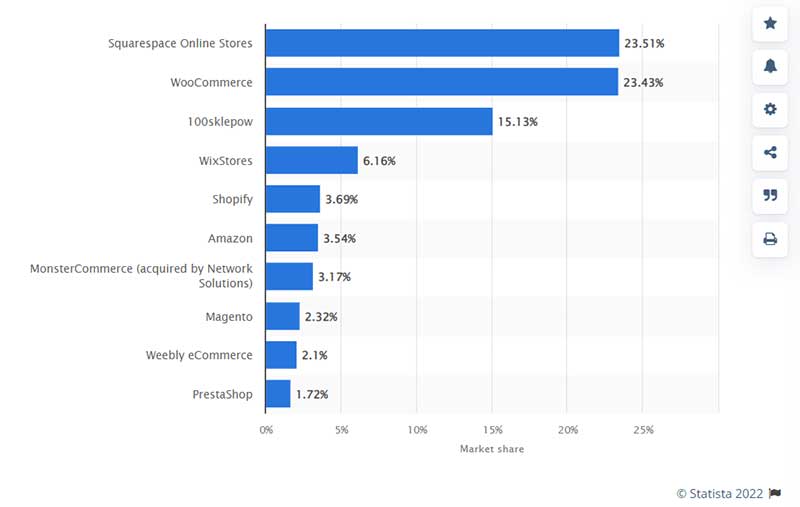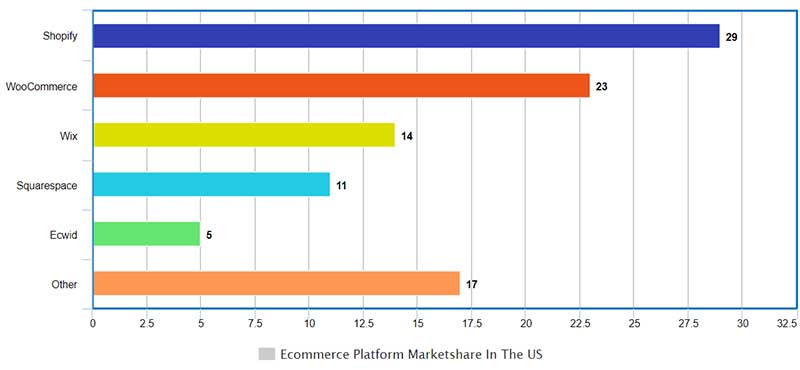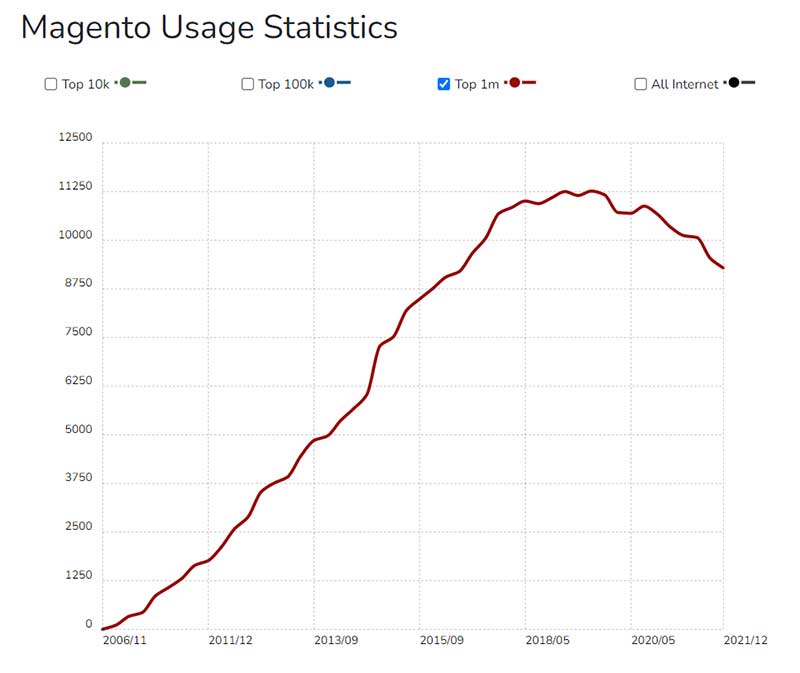Even though Shopify is widely regarded as a top ecommerce platform and a leader in the space, they do not control the majority of the market.
In fact, there are many Shopify competitors that have significantly more users and Shopify barely cracks the top 5 in terms of worldwide popularity.
According to Statista, here are the top Shopify competitors worldwide.
In the US however, Shopify has a commanding lead. Here are the top Shopify competitors in the United States.
Even though Shopify is one of the leading ecommerce platforms, it’s not the right choice for everyone. Ecommerce is constantly changing and different companies have different needs.
This post will break down the top Shopify competitors so you can make an informed decision for your business.
Get My Free Mini Course On How To Start A Successful Ecommerce Store
If you are interested in starting an ecommerce business, I put together a comprehensive package of resources that will help you launch your own online store from complete scratch. Be sure to grab it before you leave!
Shopify Competitor #1: Squarespace
Squarespace was created in 2003 as a platform for building content based websites. But recently, they added a suite of ecommerce features that allow you to sell physical and digital products online.
The main reason Squarespace has such a large worldwide market share is because they offer an easy and inexpensive way to create beautiful websites.
Squarespace offers a drag and drop website builder which allows you to create a professional and stunning looking online store without knowing how to code.
They excel at design and are known to have the best looking website templates compared to other platforms.
However, their ecommerce features are somewhat lacking and pale in comparison to Shopify.
Here’s what Shopify offers that Squarespace does not.
- Multi-currency selling support
- Better POS(point of sale) features
- Automatic tax calculations across countries and states all over the world
- Superior dropshipping features and 3rd party support
- An extensive library of 3rd party apps that extend functionality
- More payment gateway support
- Multi-language support
- Amazon FBA and multi-channel fulfillment support
Here are the main reasons to choose Squarespace over Shopify.
- Squarespace is easier to use if you want to build a beautiful website
- Squarespace has a superior content management system if you want to showcase content online
- Squarespace offers many more free templates that are fully customizable
- Squarespace is less expensive than Shopify
- Squarespace gives you a free domain upon signup
- Squarespace offers a built-in email marketing tool that is extremely inexpensive
If you are considering Squarespace over Shopify, you have to ask yourself whether your goal is to create a beautiful website or an online store.
Even though Squarespace allows you to take ecommerce transactions online, it’s only good for small hobbyist shops that sell a few products online.
If you are serious about starting an ecommerce business that can scale to 7,8 or 9 figures, then Shopify will always be the best choice.
Squarespace offers a variety of plans ranging from $14/month to $49/month. In order to start selling products online, you realistically need to sign up for the “Basic Ecommerce” plan which starts at $27/month.
Click Here To Try Squarespace For Free
Shopify Competitor #2: WooCommerce
WooCommerce is an ecommerce software plugin for WordPress that turns your WordPress blog into a fully featured online store.
WooCommerce is one of the most popular ecommerce platforms in the world and one of Shopify’s main competitors in the ecommerce space.
The most attractive aspect of WooCommerce is that it is 100% free. You also have full access to the source code and full control over your online store.
In addition, WooCommerce has a huge ecosystem of 3rd party developers that rival even Shopify’s network in size.
If you already run a WordPress blog, you can install WooCommerce in one click and instantly start selling online for free.
Among the Shopify alternatives, WooCommerce is the most flexible because you own the code and can make any customizations you want.
Watch the video below to learn how you can install WooCommerce in just 1 click.
Editor’s Note: I’ve negotiated a 63% discount off the regular price of BlueHost For MyWifeQuitHerJob.com readers.
Click Here To Sign Up For BlueHost And Save 63%
Even though Shopify and WooCommerce have similar feature sets, there are many pros and cons of using WooCommerce.
Here are the main reasons to use WooCommerce over Shopify.
- WooCommerce is free
- WooCommerce is easy to setup if you already have a WordPress blog
- WooCommerce allows you to run a powerful blog on the same domain
- WooCommerce is better for SEO
- WooCommerce has a huge 3rd party ecosystem that’s even bigger than Shopify’s
- WooCommerce apps and plugins usually don’t carry recurring fees
- WooCommerce allows you to own the code for your site
Here are the main reasons to use Shopify over WooCommerce
- Shopify is much easier to use
- Shopify is much faster than WooCommerce out of the box
- Shopify does not require any technical skills for customization
- Shopify hosts your website for you
- Shopify is easier to manage without any technical skills
The main drawback of WooCommerce is that you have to manage the technical aspects of running your online store which can be challenging for people who are not tech savvy. But it is 100% free.
For more info, read my full comparison of Shopify Vs WooCommerce.
Shopify Competitor #3: Wix
Wix is a drag and drop website builder that allows you to easily create content based websites online. Over the years, Wix has added ecommerce functionality that allows you to sell physical and digital products online.
In many respects, Wix is a direct competitor to Squarespace. They allow you to create beautiful looking websites without any coding knowledge required.
Wix’s main strength is the ability to simplify the entire process of selling online. However, their ecommerce feature set is extremely limited compared to Shopify.
Similar to Squarespace, Wix is only good for hobbyist sellers who want to casually sell a few products online.
If you want to start a fully featured store that can scale to 7, 8 or 9 figures, then Shopify is the superior choice.
Here’s what Shopify offers that Wix does not.
- Superior dropshipping features and 3rd party support
- An extensive library of 3rd party apps that extend functionality
- More payment gateways to choose from
- Multi-language support
- Amazon FBA and multi-channel fulfillment support
- Flexible ecommerce themes and a larger selection to choose from
Here are the main reasons to choose Wix over Shopify.
- Wix is easier to use if your goal is to build a beautiful website
- Wix offers an artificial intelligence based website builder which allows you to start selling faster
- Wix has a superior content management system if you want to showcase content online
- Wix is less expensive than Shopify
Wix offers a variety of “Business and E-commerce” plans that range from $23 to $500 per month as displayed below.
- Business Basic – $23 per month
- Business Unlimited – $27 per month
- Business VIP – $49 per month
- Enterprise – $500 per month
For a more in depth comparison, read my review on Shopify Vs Wix
Shopify Competitor #4: Ecwid
Ecwid is an ecommerce widget that can be embedded on any website or social media platform to instantly start selling online.
The beauty of the Ecwid platform is that it’s fully hosted which means that you don’t have to worry about the tech.
And, the best part is that Ecwid is 100% free to use for up to 10 products. Their free plan is literally free forever and you also get access to free technical support.
The main benefit of Ecwid is that their platform is headless. Basically, you set up your online store once and you can easily sync and sell across your website, TikTok, Instagram and marketplaces like Amazon at the same time.
Your inventory levels are automatically updated when a sale is made so all of your stores stay in sync.
Ecwid’s only drawback is that they do not have a good 3rd party developer ecosystem and their feature set is somewhat limited.
For example, Ecwid is not directly compatible with Klaviyo which is a popular email marketing tool among ecommerce merchants.
But overall, Ecwid offers most of the features you need to start selling online and it’s easy to use.
Ecwid charges based on the number of products you sell and plans range from free to $99/month.
- Free — Free for up to 10 products
- Venture — $15 per month for up to 100 products
- Business — $35 per month for up to 2,500 products
- Unlimited — $99 per month for unlimited products
Here’s what Shopify has that Ecwid does not.
- Superior dropshipping features and 3rd party support
- An extensive library of 3rd party apps that extend functionality
- More payment gateway support
- More comprehensive multi-currency selling options
- You can sell an unlimited number of products online
- Amazon FBA and multi-channel fulfillment support
- Better point of sale features
Here are the main reasons to choose Ecwid over Shopify.
- 100% free for up to 10 products
- Cheaper than Shopify across most plans
- You want to turn an existing website into an online store
- You want to sell across different platforms and social media
- No transaction fees for using a 3rd party payment gateway
- Ecwid allows for larger file sizes when selling digital products (25 GB vs 5GB)
Click Here To Try Ecwid For Free
Shopify Competitor #5: Shift4Shop
Shift4Shop is a fully hosted ecommerce platform similar to Shopify that allows you to easily start an online store. But the main difference is that Shift4Shop is 100% free for shops based in the United States.
Even though Shift4Shop is not among the top 10 most popular ecommerce platforms yet, it’s adoption has increased dramatically in the past few years after giving away their services for free.
The best part is that there’s no catch. Shift4Shop is truly free. However, you must use their payment processor similar to the way Shopify makes you use Shopify Payments.
Editor’s Note: Shopify technically doesn’t force you to use Shopify Payments but they charge high transaction fees that make it extremely unattractive.
Not only is Shift4Shop free but they also offer far more features than Shopify out of the box.
In fact, running a store on Shift4Shop is almost guaranteed to be cheaper than Shopify across the board and you don’t have to sacrifice any ecommerce functionality.
The only downside is that Shift4Shop has so many features built in that it makes Shift4Shop much harder to use than Shopify. Their user interface is not as intuitive.
Here are the main reasons to choose Shopify over Shift4Shop.
- Much easier to use and setup
- Superior dropshipping features and 3rd party support
- An extensive library of 3rd party apps that extend functionality
- Shopify has more 3rd party developers for hire
- New ecommerce features come to Shopify first
Here are the main reasons to choose Shift4Shop over Shopify.
- 100% free for merchants in the United States
- Cheaper than Shopify across the board
- More features than Shopify out of the box including free email marketing
- Better SEO features
Overall, Shift4Shop is a viable alternative to Shopify at a small fraction of the price.
For more information, read my full comparison of Shift4Shop Vs Shopify
Click Here To Use Shift4Shop For Free
Shopify Competitor #6: BigCommerce
BigCommerce is a fully hosted ecommerce platform that offers all of Shopify’s ecommerce features and more at a lower price point.
They have an extensive library of beautiful themes for free. And, they handle all of the tech so you can start selling right away.
BigCommerce’s biggest advantage is that they offer many more ecommerce features out of the box compared to Shopify.
For example, BigCommerce has superior discounting features on their cheapest plan that allow you to implement buy one get one free promotions, tiered discounts and discounts for repeat customers.
With Shopify, you would need to pay for an app to achieve similar functionality.
Overall, BigCommerce is a fierce competitor to Shopify with similar functionality and support at a lower price point.
BigCommerce offers a variety of plans ranging from $29.99 to $299/month.
- Standard – For stores making up to $50K/year
- Plus – For stores making up to $150K/year
- Pro – For stores making up to $400K/year
Here are the main reasons to choose BigCommerce over Shopify.
- More features than Shopify out of the box
- Cheaper than Shopify
- No transaction fees
- Built in features for multi-channel selling
- More payment gateway options
- Better support for integrating a WordPress blog
- Better SEO features
- More product options
- Better international support
- More flexible discounting features
Here are the main reasons to choose Shopify over BigCommerce.
- Slightly easier to use and setup than BigCommerce
- Better 3rd party developer support
- Shopify offers an extensive library of 3rd party apps that extend functionality
- Shopify has more 3rd party developers for hire
- New ecommerce features come to Shopify first
For more information, read my full comparison of Shopify Vs BigCommerce
Click Here To Try BigCommerce For Free
Shopify Competitor #7: Magento
Magento is a free open source ecommerce platform that is 100% free to use.
Back in the day, Magento was the standard ecommerce platform for enterprise level stores requiring a rich feature set.
But over the years, Shopify has taken away significant market share from Magento because Magento is unwieldy and difficult to use.
Here’s a graph of Magento usage over the past several years. Not looking good.
Even though Magento is feature rich and 100% free to use, you’ll end up spending more money than Shopify hiring developers to maintain Magento’s extremely complicated code base.
Overall, Magento is reserved for high end enterprise ecommerce businesses that want to retain full control over their code with a powerful feature set.
Here are the main reasons to choose Magento over Shopify.
- You need to fully customize your store
- You want to own your source code
- You want full control over your platform
- You run an enterprise level business with developers on staff
Here are the main reasons to choose Shopify over Magento.
- Much easier to use and setup
- No need to have a webhost
- Better 3rd party support
- An extensive library of 3rd party apps that extend functionality
- New ecommerce features come to Shopify first
- Cheaper and easier to maintain
Shopify Competitor #8: Open Cart
OpenCart is an open source ecommerce platform that is extremely fast, well supported and 100% free.
OpenCart’s main advantage over open source rivals like WooCommerce and Magento is that the code is lightweight and fast.
The platform is well coded, easy to understand and they have a decent sized plugin library so you can add whatever features that you need.
The only downside is that OpenCart is much less popular than WooCommerce and carries significant platform risk. If OpenCart’s developers were ever to stop supporting the platform, you would be stuck with an obsolete website.
But overall, OpenCart is a fantastic lightweight and easy to use ecommerce platform that allows you to own your website and source code.
Here are the main reasons to choose OpenCart over Shopify.
- You need to fully customize your store
- You want to own your source code
- You want full control over your platform
- You want a fast website
Here are the main reasons to choose Shopify over OpenCart.
- Much easier to use and setup
- Better 3rd party support
- An extensive library of 3rd party apps that extend functionality
- New ecommerce features come to Shopify first
For more information, read about my favorite free ecommerce platforms.
Which Shopify Competitors Should You Use?
Every Shopify competitor mentioned in this article is either free or offers a free trial and I recommend that you test drive each platform.
Then, answer these questions to choose the best Shopify competitor for your business.
If you run an enterprise level business, you have the budget and you are looking for a fully hosted ecommerce platform, then go with BigCommerce.
BigCommerce hosts a number of large ecommerce businesses such as SkullCandy, Ben & Jerry’s, SuperDry and more. With BigCommerce, your store can easily scale as you grow.
Click Here To Try BigCommerce For Free
If you live in the US and you are looking for a free ecommerce platform as powerful as Shopify, then go with Shift4Shop.
Shift4Shop has every selling feature that you need out of the box including free email marketing.
Click Here To Try Shift4Shop For Free
If you already have a WordPress blog and you want to start selling products on your website, then go with WooCommerce.
WooCommerce is 100% free and an extremely powerful ecommerce platform. In fact, WooCommerce hosts many enterprise level shops including Dr. Scholl’s, Nalgene and more.
Click Here To Try WooCommerce For Free
If you already have a website of any kind and you want to start selling products online, then go with Ecwid.
Ecwid is free for up to 10 products and you don’t have to worry about the tech. Plus, you can sell across many different platforms and keep all of your inventory in sync.
Click Here To Try Ecwid For Free
If you want to create a content based site that sells a few products and you are on a budget, then go with Wix or Squarespace.
Wix and Squarespace are easy to use and offer drag and drop builders to create a beautiful looking website in minutes. However, your selling options will be limited.
Click Here To Try Squarespace For Free
Click Here To Try Wix For Free
If owning your own platform and source code is important, then go with either Magento, WooCommerce or Open Cart.
Use Magento if you run an enterprise level shop.
Use WooCommerce if you are familiar with WordPress already.
Use OpenCart if you want a fast and lightweight shopping cart.

Ready To Get Serious About Starting An Online Business?
If you are really considering starting your own online business, then you have to check out my free mini course on How To Create A Niche Online Store In 5 Easy Steps.
In this 6 day mini course, I reveal the steps that my wife and I took to earn 100 thousand dollars in the span of just a year. Best of all, it's free and you'll receive weekly ecommerce tips and strategies!
Related Posts In Ecommerce Platforms
- How Cheap Shared Hosting Companies Are Lying To You
- The Top 8 Shopify Competitors To Consider For Your Small Business
- WooCommerce Vs Shopify – Which Platform Is Better For You
- Shopify Vs Wix – Which Is Better For Ecommerce?
- Top 8 Shopify Alternatives That Are Cheaper And Better

Steve Chou is a highly recognized influencer in the ecommerce space and has taught thousands of students how to effectively sell physical products online over at ProfitableOnlineStore.com.
His blog, MyWifeQuitHerJob.com, has been featured in Forbes, Inc, The New York Times, Entrepreneur and MSNBC.
He's also a contributing author for BigCommerce, Klaviyo, ManyChat, Printful, Privy, CXL, Ecommerce Fuel, GlockApps, Privy, Social Media Examiner, Web Designer Depot, Sumo and other leading business publications.
In addition, he runs a popular ecommerce podcast, My Wife Quit Her Job, which is a top 25 marketing show on all of Apple Podcasts.
To stay up to date with all of the latest ecommerce trends, Steve runs a 7 figure ecommerce store, BumblebeeLinens.com, with his wife and puts on an annual ecommerce conference called The Sellers Summit.
Steve carries both a bachelors and a masters degree in electrical engineering from Stanford University. Despite majoring in electrical engineering, he spent a good portion of his graduate education studying entrepreneurship and the mechanics of running small businesses.






















